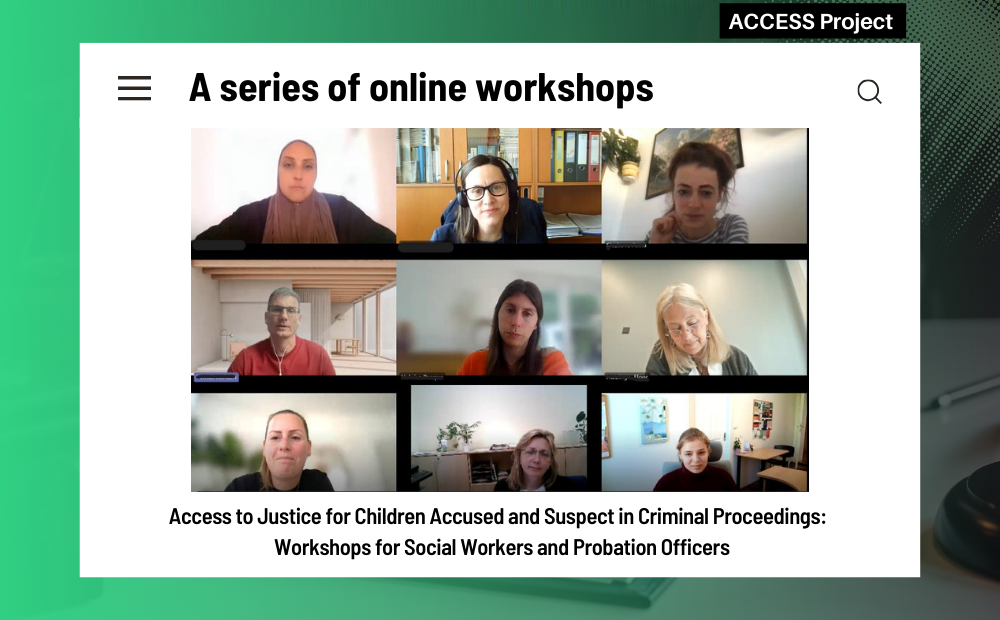Brussels, 5 May 2025
The International Commission of Jurists (ICJ) organized a series of workshops for social workers and probation officers working with children from Belgium, Bulgaria, the Czech Republic, Poland, the Netherlands and Slovakia. The goal was to share experiences, identify common challenges, and highlight effective practices in supporting children in conflict with the law.
Topics discussed included methods of conducting individual assessment of children, diversion options as alternatives to formal criminal proceedings, the availability of support organizations, the role of parents throughout justice processes, and the impact of institutional discrimination on children in conflict with law.
Participants agreed that there is an urgent need for increased funding and specialised training for social workers and probation officers. Many are expected to work with both adults and children, often without adequate preparation for engaging with young people. For example, caseload comparisons showed that professionals in the Czech Republic and Slovakia may handle up to nine times more cases than their counterparts in the Netherlands, severely limiting their capacity to deliver quality, individualized care to children. Support for children with disabilities remains limited in many places, and there is a clear need for better training in this area.
A further concern was the lack of coordination among services and organizations. Although many non-profit organizations offer support to children and families, professionals are often unaware of these resources due to the absence of a centralized coordination mechanism. Consequently, children may interact with several different social workers during legal proceedings:
“Children in conflict with the law often interact with multiple social workers throughout the proceedings, which often results in a loss of continuity and trust,” one participant observed.
Participants raised concerns about systemic discrimination and inequality. Marginalized children, such as Roma children, are especially at risk. In some contexts, structural factors such as poverty or a lack of extracurricular activities are treated as risk indicators, which can result in stricter measures rather than support or prevention efforts. Restorative practices and diversionary approaches, such as family group conferencing, were highlighted as more constructive alternatives.
Discussions further addressed the individual assessment of children and transparency. In most jurisdictions children rarely receive individual assessment reports in a format they can understand, nor are there clear mechanisms for appealing those findings. A shift in perspective was recommended: assessments should not serve as tools for control, but as part of a participatory, rights-based process that engages the child meaningfully.
The discussions ultimately pointed to a clear and shared conclusion that there is an urgent need to move beyond viewing children in conflict with the law as offenders. Instead, justice and social systems must recognize them as young people in need of support, protection, and the opportunity to grow within a supportive and inclusive environment.
Background
On 22 April 2025, the ICJ launched a series of online workshops for lawyers, judges, prosecutors and law enforcement personnel, social workers and probation officers, on access to justice for children suspected or accused in criminal proceedings. These workshops were organized within the framework of the ACCESS project and as a follow-up on the Transnational Exchange Roundtable held in March 2025 in Brussels. The aim was to explore specific issues in greater depth and strengthen legal assistance for children in conflict with the law.
The ACCESS project aims to foster EU-wide effective and non-discriminatory access to justice for children in criminal proceedings, and respect for children’s procedural rights amongst legal and other professionals. The project is implemented by the ICJ in partnership with NJCM – the Dutch section of the International Commission of Jurists, Forum for Human Rights in Czechia and Slovakia, Helsinki Foundation for Human Rights in Poland, Bulgarian Helsinki Committee, Defence for Children International – Belgium, with the support of ENNHRI – the European Network of National Human Rights Institutes.
Contact
Karolína Babická, ICJ Senior Legal Advisor, karolina.babicka@icj.org
Viktoryia Konashava, ICJ Legal Researcher, viktoryia.konashava@icj.org





